Last Updated on March 11, 2024 by Tia
Traveling with food allergies is not and will never be easy. Because no one talks about how awful it is to be sick and bloated for your entire travel duration. Or have to pack 10 types of medication you know you will probably need!
And no one talks about how hard it is to be able to resist tucking into a country’s cuisine – one of the things that make or break a travel experience!
After all, embarking on a journey to explore the rich cultures, landscapes, and cuisines of faraway lands is an exciting prospect for us all.
Because for most people, traveling is a chance to let loose, relax our normal eating and exercise habits, and enjoy our holiday. For most, a holiday is all about cocktails and a beach, fun nights out, and embracing local cuisine.
However, for those dealing with food allergies, especially individuals like me suffering from Irritable Bowel Syndrome (IBS) and lactose intolerance, the culinary adventure may come with its own set of challenges.
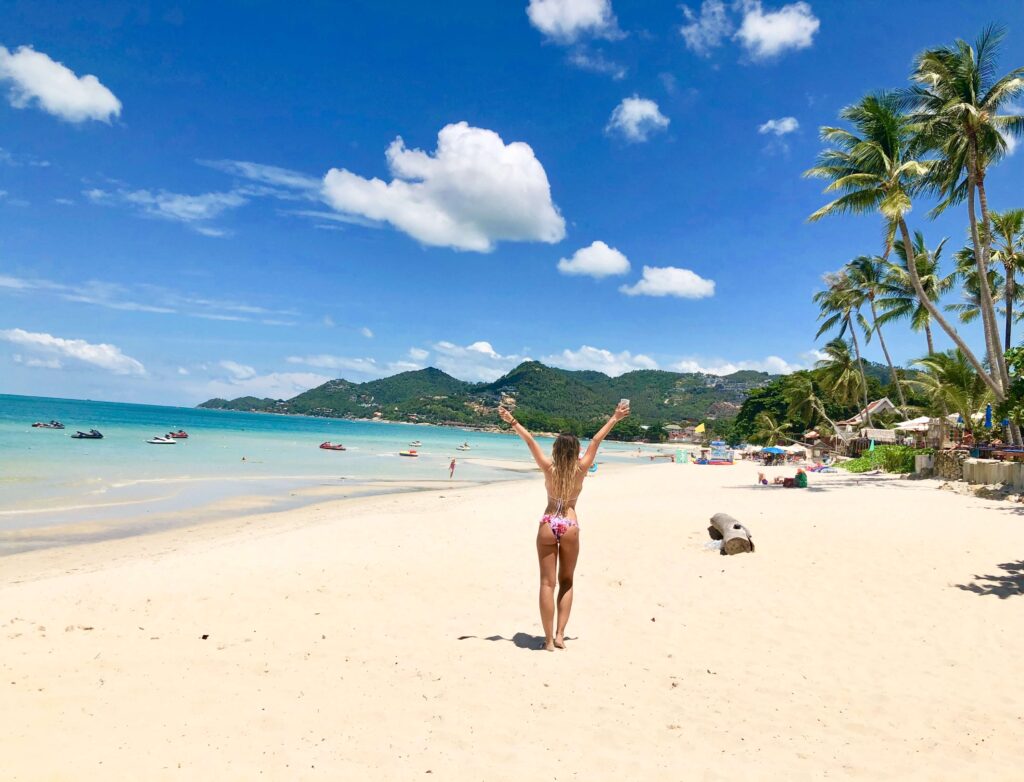
This blog post aims to provide valuable advice and tips to help travelers with food allergies like IBS and lactose intolerance safely enjoy their journies all over the world, particularly through Asia and Latin America.
Because in Europe, things are slightly easier. The more cosmopolitan a city, the more options there are – and trust me, you need options when you are traveling with food allergies!
But in regions like Asia and Latin America, things are a little more…complicated. And that’s when you need to be prepared.
So keep reading for my guide to traveling with food allergies and my top tips to keep you healthy and symptom-free as much as possible ( because you already know you will get symptoms at LEAST ONCE!)
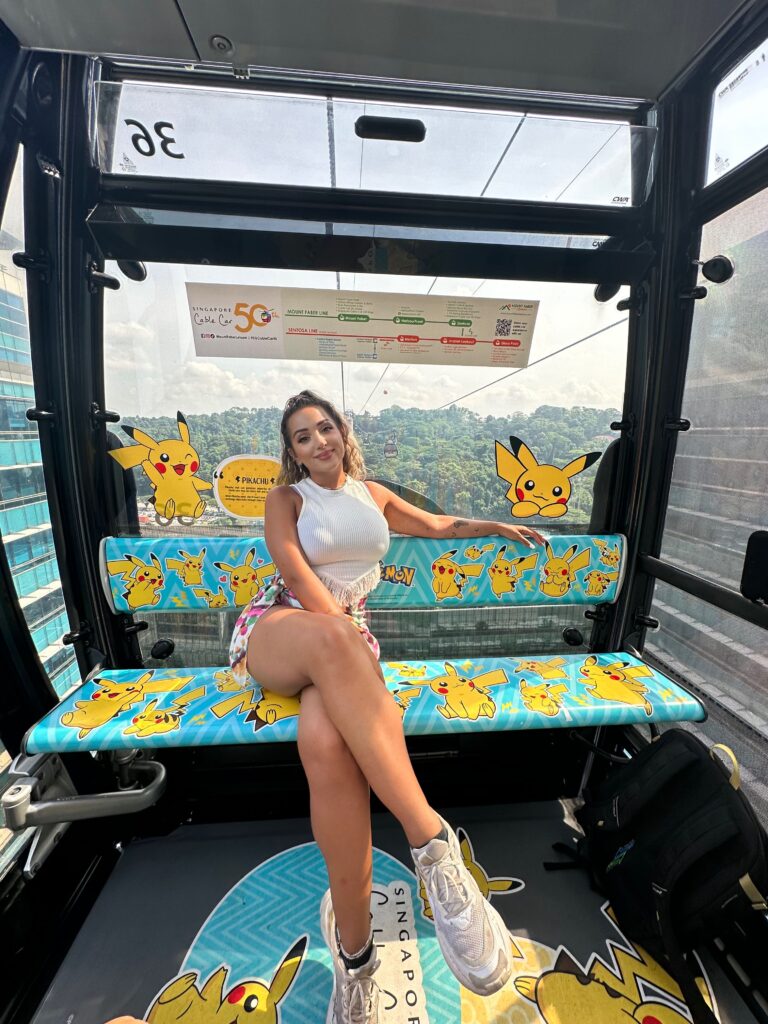
Table of Contents
What to expect from this article
This guide is NOT a medical article. It’s simply a guide based on my journey with IBS and lactose intolerance and ways I have found to manage it whilst traveling.
There are far more serious food allergies out there – like Celiac, Crohn’s, and Peanut allergies. If you suffer from those, then please visit this guide
Why is my IBS and Lactose Intolerance worse when I travel?
I have suffered from IBS and lactose intolerance for a little over 12 years now, and it is always at its worst when I travel or am extremely stressed. Travel disrupts your routine, including meal times and sleep patterns.
The body’s internal clock, known as the circadian rhythm, can affect digestion and bowel habits. Symptoms are mostly stomach cramps, extreme bloating, changes in bowel movements, and weight gain.
My lactose intolerance gives me the same symptoms that also include cystic acne. One whiff of fresh cream or cheese and my skin flares up within 24 hours, and those cysts take weeks to disappear! Both are chronic conditions and YES I have tried everything for them!
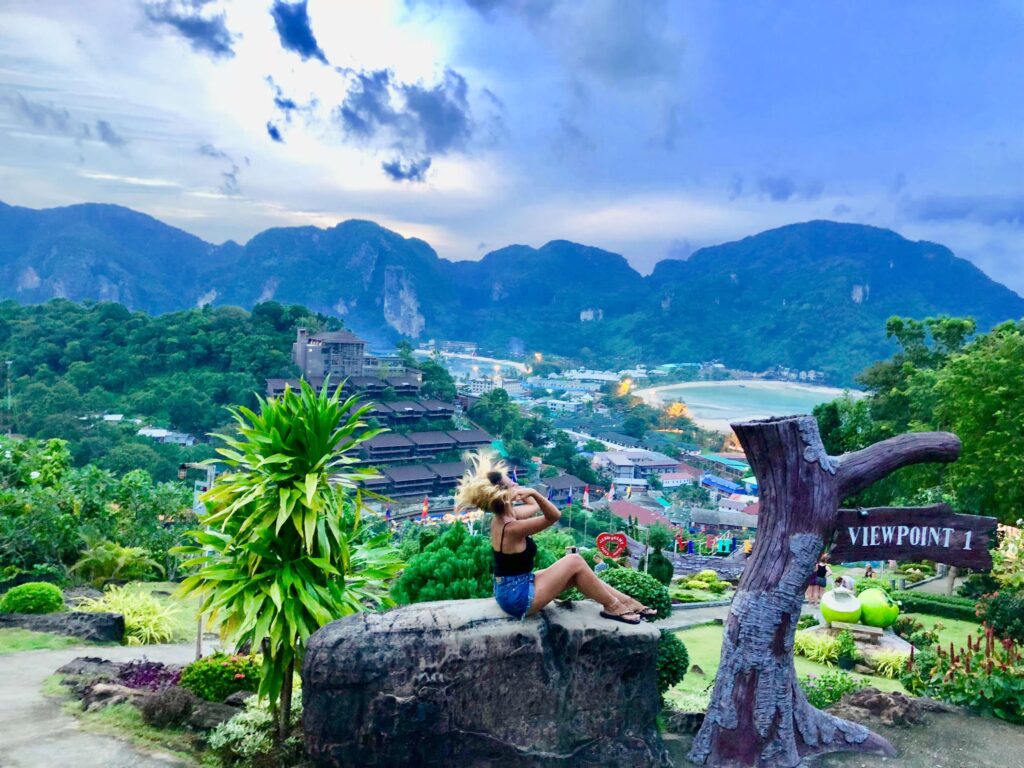
1. Stop Symptoms on the plane
Irritable Bowel Syndrome (IBS) flare-ups during flights can be attributed to various factors related to the travel experience. Realistically, it can take days for symptoms to relax after a flare-up on the plane so it’s best if you can eliminate them before they begin!
Here are some common reasons why IBS symptoms might worsen during air travel with solutions to each trigger!
A. Stress and Anxiety: if flights stress you out, consider taking a sleeping aid or relaxant to calm you down when boarding. Stress is a known trigger for IBS symptoms, and travel can heighten stress levels.
Solution: Manage stress: Practice relaxation techniques, such as deep breathing or meditation, to reduce stress and anxiety.
B.Changes in Routine: Travel disrupts your routine, including meal times and sleep patterns. The body’s internal clock, known as the circadian rhythm, can affect digestion and bowel habits.
Solution: Stick to your routine: Try to maintain regular meal and sleep schedules as much as possible.
Top tip for traveling on long-haul flights: Make sure the lengthier part of your flight is close to your normal sleeping hours so you can sleep on the plane!
C. Dehydration: Airplane cabins are often dry, and dehydration can exacerbate IBS symptoms. It’s essential to stay well-hydrated during flights by drinking water regularly.
Solution Stay hydrated: Drink plenty of water before and during the flight.
D. Dietary Changes: Airline meals or snacks ALWAYS contain ingredients that trigger IBS symptoms. Additionally, individuals with IBS often have specific dietary requirements, and it can be challenging to find suitable food options while traveling.
Solution: Pack snacks: Bring along familiar, well-tolerated snacks to avoid triggering foods. Additionally, ordering a special meal, such as an allergen meal, gluten-free meal or non-lactose meal, among others, can be requested from your airline typically within 48 hours.
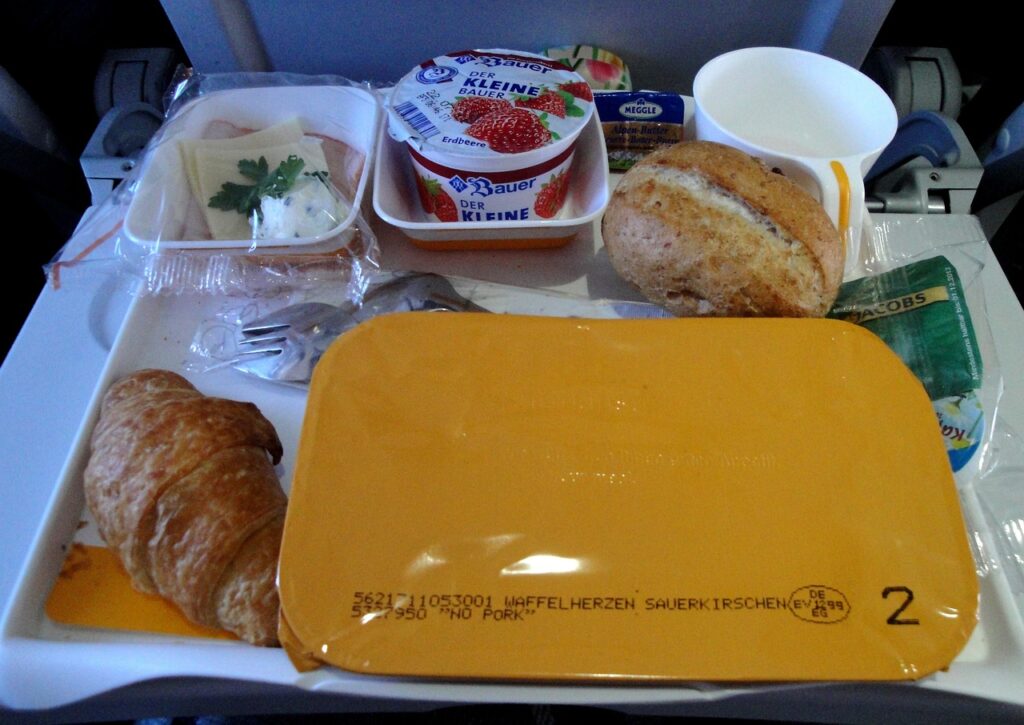
E. Pressure Changes: Changes in cabin pressure during takeoff and landing can affect the gastrointestinal system.
Solution: Medicate: I always take an activated charcoal tablet 20 minutes before takeoff which helps keep bloating to a minimum.
F. Physical Inactivity: Prolonged periods of sitting during a flight can contribute to constipation or discomfort for individuals with IBS. Lack of movement may slow down digestion and bowel motility.
Solution: Try to get up every 1-2 hours and stretch your legs and torso. Also, gently massage your belly in circular motions every few hours for a couple of minutes at a time!
G. Jet Lag: Crossing multiple time zones can disrupt the body’s internal clock, leading to jet lag. Changes in sleep patterns and meal times associated with jet lag may impact IBS symptoms.
Solution: I have an article on how to beat the dreaded jet lag filled with tips!
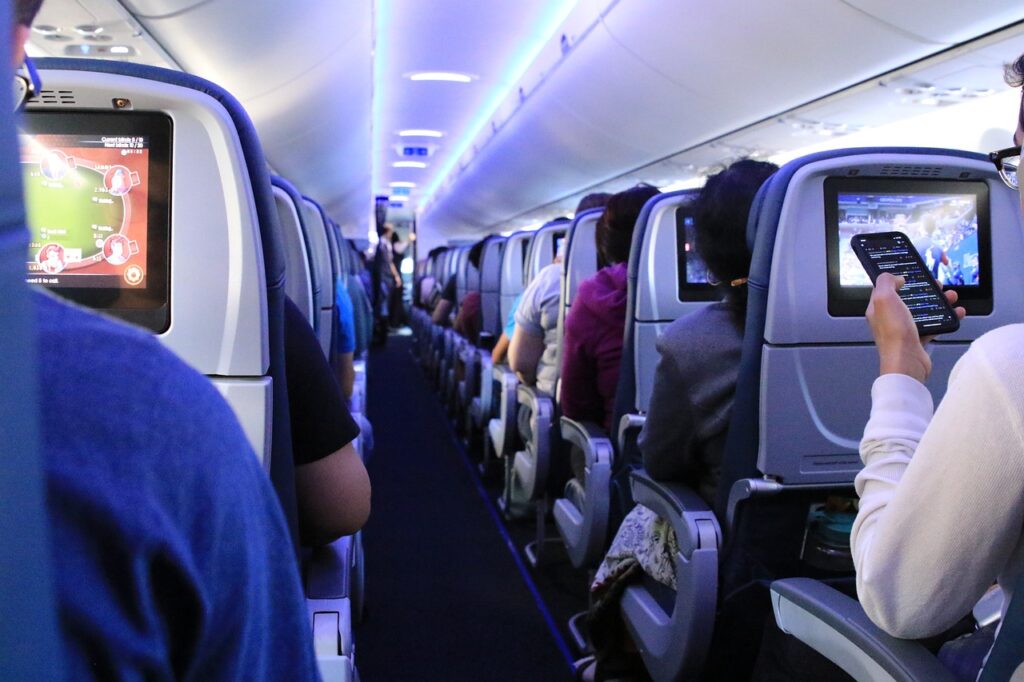
2. Research and Plan Ahead
Before setting foot on foreign soil, research the local cuisine and common ingredients used in the countries you plan to visit. Familiarize yourself with the names of allergens in the local languages (difficult with ibs as there are dozens).
Alternatively, carry a translated card explaining your dietary restrictions. Apps like Google Translate can be handy for this purpose.
Knowing basic phrases related to your food allergies can be immensely helpful. Learn how to communicate phrases such as “I am allergic to [allergen]” and “Does this dish contain [allergen]?” in the local language. Locals appreciate the effort, and it helps ensure clear communication about your dietary needs.
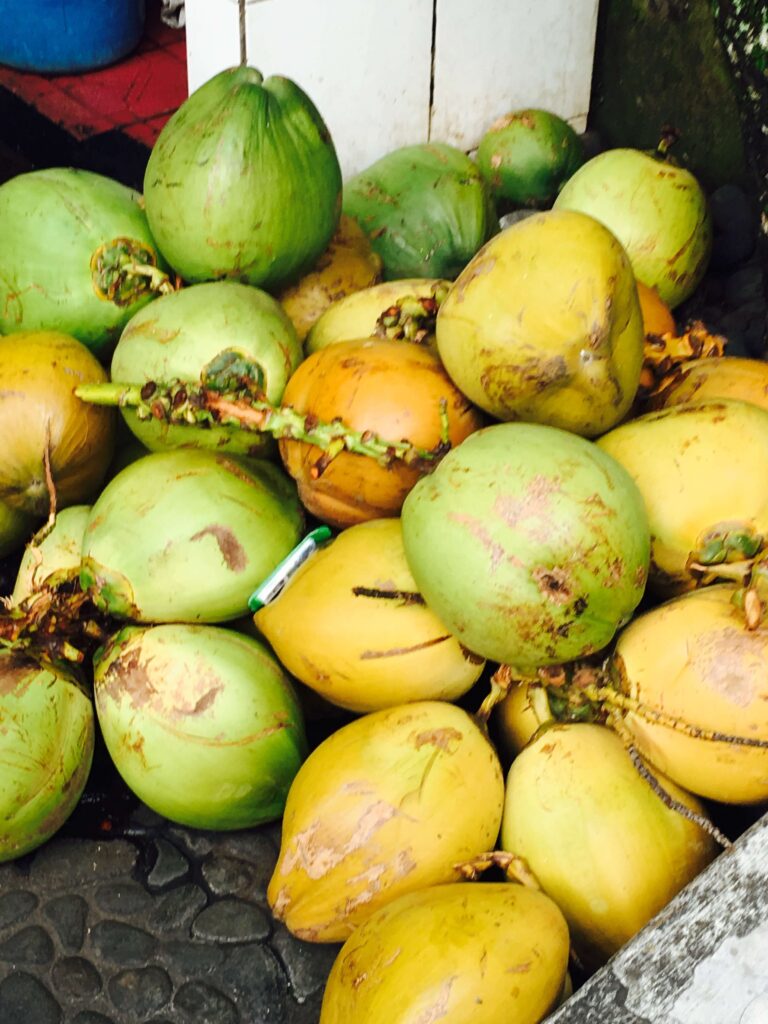
3. Accommodations with Kitchen Facilities:
Consider booking accommodations that offer kitchen facilities. This provides you with the option to prepare simple meals using ingredients you trust.
Additionally, having a refrigerator can be beneficial for storing allergen-free snacks, even in a hotel room.
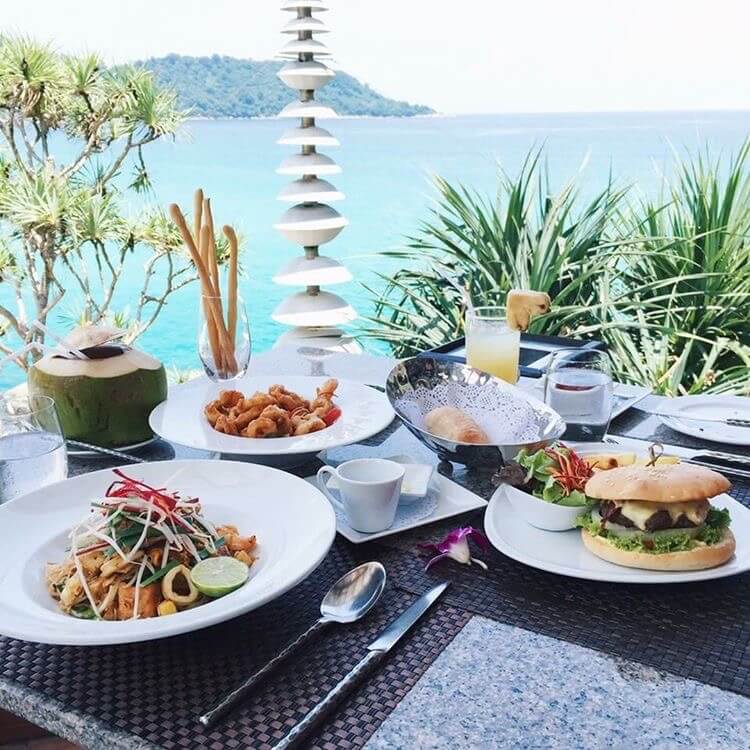
4. Pack Snacks
Always carry a supply of safe snacks for those moments when finding allergen-free options may be challenging.
Portable snacks like rice cakes, nuts, seeds, and fruits can be a lifesaver, especially during long journeys or in areas where allergen-free options are limited.
My backpack is always equipped with a few snacks and of course, water, in my favorite cooling travel bottle

5. Communication is Key
When dining out, don’t hesitate to communicate your dietary restrictions to the restaurant staff.
Be clear about your allergies, and ask questions about ingredients and preparation methods. Many chefs are willing to accommodate special dietary needs when informed in advance.

6. Book Restaurants in advance
The restaurant you will dine in is quite important. For example, onion and garlic are two of the major IBS sufferer’s typical ”No’s”. Therefore, I often opt for steakhouses and seafood restaurants with no sauces on my protein and something simple, like rice or a jacket potato. Simple meals just work best for me.
The better the restaurant, the more often you will find it fully booked, so book ahead to stay within your meal times and eat within your restrictions.
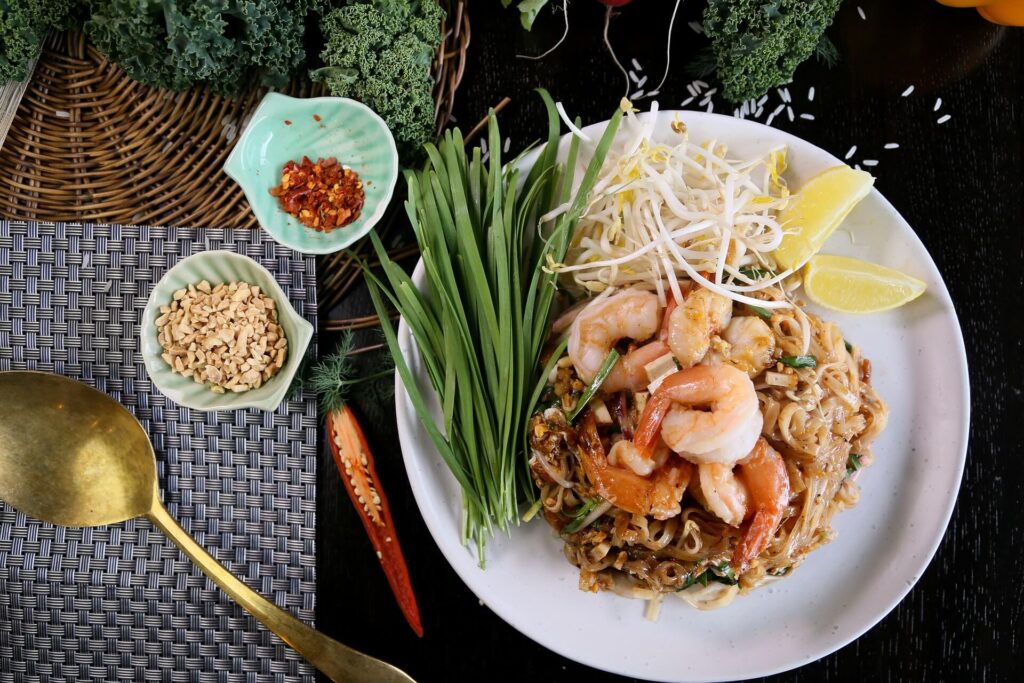
7. Seek Allergy-Friendly Restaurants
Utilize online resources, such as travel forums and apps, to find allergy-friendly restaurants in the area.
Many cities now have establishments that cater specifically to individuals with food allergies, offering a safe dining experience.
8. Explore Local Markets:
Visit local markets to explore fresh, unprocessed foods. Fruits, vegetables, and meats purchased directly from markets can be a safer option than processed or pre-packaged items, where hidden allergens might be present.
I stay away from most pre-packaged foods for years now (unless I’m intentionally saying ”screw it” I’m eating it, and Jesus can take the wheel)
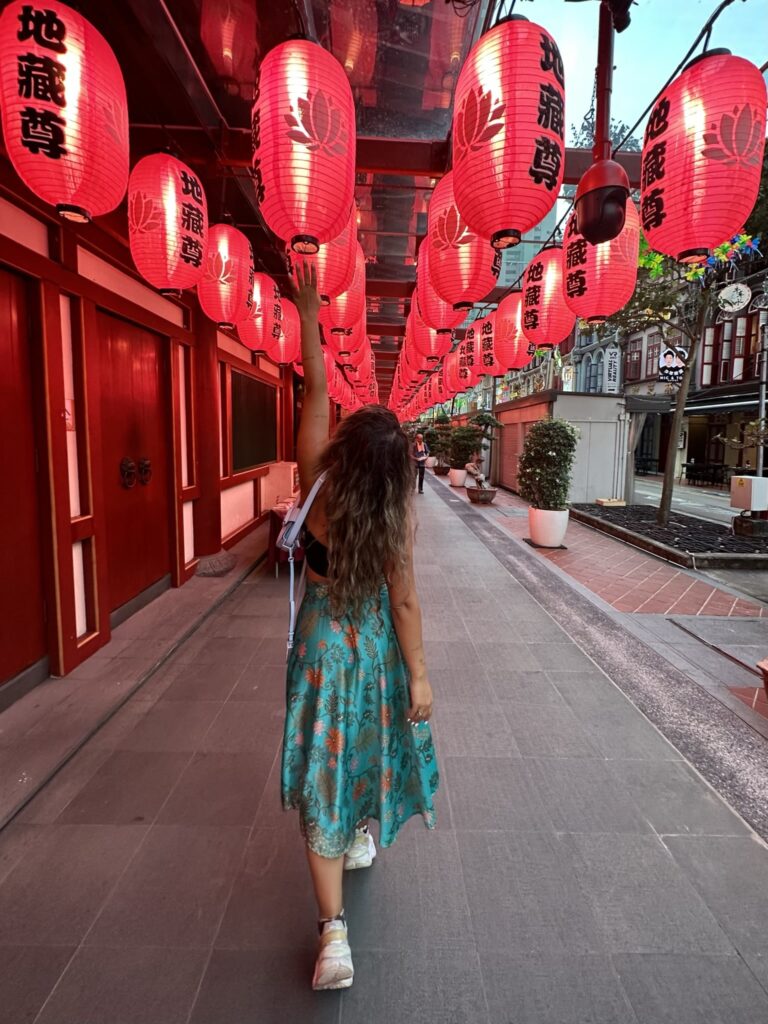
9. Stay Hydrated
Drinking plenty of water is essential, especially in regions with different climates. However, be cautious about the source of water to avoid potential contamination.
Opt for bottled water always, or use water purification methods.
10. Connect with Local Allergy Groups:
Before your trip, contact local allergy support groups or communities. They can provide valuable insights, and recommendations, and even connect you with individuals who have similar dietary restrictions and travel experiences.

11. Control your portions
Remember to pay attention to portion sizes when traveling with food allergies. I am often tempted to over-eat and indulge whilst on vacation, but large portions are a huge trigger for IBS. It is far better to eat less and more often, to give your body the time to properly digest.
12. Find clever substitutes
As mentioned before, garlic and onions are usually big IBS triggers. But you don’t have to constantly deprive yourself of them!
So consider using garlic-infused oil for flavor instead of using garlic directly, as this can provide a taste without the high FODMAP content.
Coconut milk, is a great substitute for fresh cream in creamy sauces too, and the use of spices like paprika and oregano makes meat taste delicious without the need for onion powder.

13. Pack Medications
Because let’s be honest; we both know you will need it! I have yet to travel once and not have to deal with a flare-up, and I have done some serious traveling!
Ensure you have an ample supply of any necessary medications, such as antihistamines or digestive aids, in case of accidental exposure to allergens.
I always carry digestive enzymes and stomach cramps medication and I swear by activated charcoal tablets, which I take daily when I travel and they help immensely!
If your allergy requires a prescription then please carry it in the local language in case you need more or lose it.

Here is a list of other useful medications to regulate IBS symptoms while traveling with food allergies
List of Useful Medications for traveling with food allergies and IBS
Probiotics
- Probiotics are beneficial bacteria that can help maintain a healthy balance in the gut microbiota.
Peppermint Oil
- Peppermint oil has been studied for its potential to alleviate symptoms of IBS, particularly for reducing abdominal pain and bloating.
Fiber Supplements
- Soluble fiber supplements, such as psyllium husk, may help regulate bowel movements and relieve constipation in some individuals with IBS.
Digestive Enzymes
- I take these NOW digestive enzymes daily, and they are cheaper on Amazon! If your IBS, involves issues related to food digestion, you may benefit from digestive enzyme supplements. These enzymes can help break down carbohydrates, fats, and proteins.
Melatonin
- Melatonin, a hormone that regulates sleep, has been studied for its potential to improve sleep quality and reduce IBS symptoms. These melatonin gummies are delicious!
Calcium and Magnesium
- Calcium and magnesium supplements may help regulate bowel movements. However, it’s crucial to avoid excessive intake, as this can lead to side effects. Always consult with a healthcare professional before supplementing with minerals.
L-Glutamine
- L-glutamine is an amino acid that plays a role in maintaining the health of the intestinal lining. Some studies suggest that it may have a positive impact on symptoms of IBS as it protects the intestine barrier. I take them daily!
*Disclaimer*: Remember, the effectiveness of supplements can vary, and what works for one person may not work for another. It’s essential to work closely with a healthcare professional to determine the most appropriate supplements based on individual symptoms and needs. Lifestyle modifications, stress management, and dietary changes are also critical components of managing IBS.
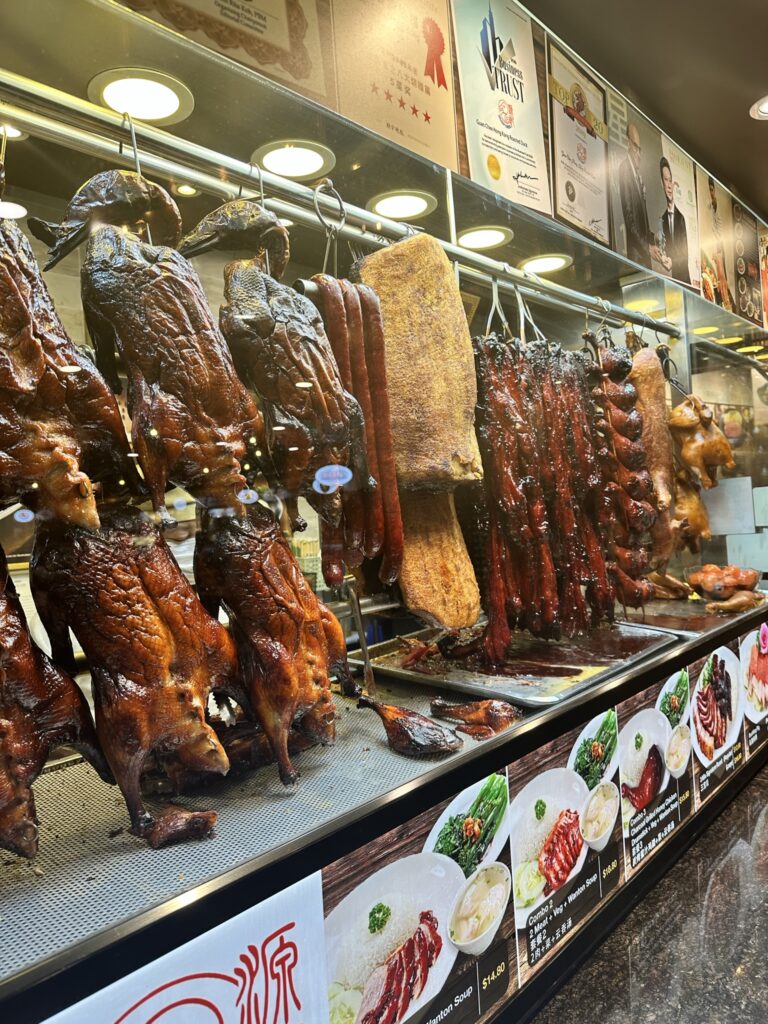
Traveling with food allergies and IBS in Asia
Individuals with Irritable Bowel Syndrome (IBS) may have different triggers and sensitivities, so there isn’t a one-size-fits-all answer to how they tolerate Asian cuisine. However, here are some general considerations:
Foods to avoid eating in Asia
- Spices and Heat: Some people with IBS find that spicy foods, common in many Asian cuisines, can exacerbate symptoms. Dishes with chili peppers, garlic, and onions are often triggering. However, not everyone with IBS is sensitive to spice, so it varies from person to person.
- Garlic and Onions: Certain compounds in garlic and onions, such as fructans, can trigger IBS symptoms in some individuals. Many Asian dishes include these ingredients, so people with IBS might need to choose dishes without them or request modifications.
- FODMAPs: Some Asian ingredients can be high in FODMAPs (fermentable oligosaccharides, disaccharides, monosaccharides, and polyols), which are types of carbohydrates that can be poorly absorbed in the small intestine and may trigger IBS symptoms.
- Portion Size and Greasiness: Large portion sizes or greasy foods might be problematic for some IBS sufferers. Asian cuisines often include family-style servings, so individuals may need to be mindful of portion sizes.
IBS-friendly meals in Asia:
Here are some relatively plain and simple Asian dishes that might be gentler on the digestive system and could be considered by individuals with IBS:
- Steamed Rice with Grilled meat,fish or tofu: Use minimal seasoning or opt for plain soy sauce in moderation.
- Miso Soup: Miso soup is a traditional Japanese dish made with fermented soybean paste, seaweed, and tofu. The broth is often light and can be soothing for the stomach. It’s essential to check for added ingredients that might trigger IBS symptoms.
- Sushi with Simple Ingredients: Sushi rolls with plain rice, fish and seaweed can be a good option. Opt for low-FODMAP options if you are sensitive to certain carbohydrates.
- Plain Noodles with Light Broth: Rice noodles or plain wheat noodles with a simple broth can be easier on the stomach. And Pho is delicious, so you are in luck!
- Stir-Fried Vegetables with Plain Protein: Stir-fried vegetables with well-cooked chicken, shrimp, or tofu can be a lighter option. Minimize the use of garlic and onions, or consider using garlic-infused oil for flavor.
- Congee (Rice Porridge): Congee is a rice porridge in a light broth.It is easily digestible and can be customized with well-cooked protein and simple seasonings.
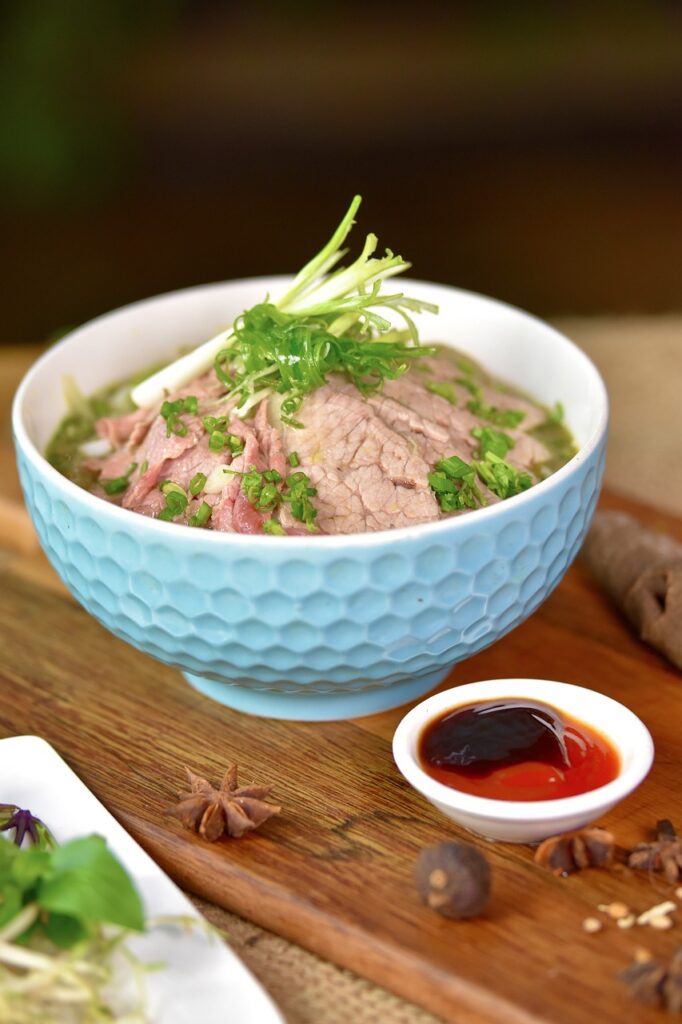
*Disclaimer* It’s important to note that IBS is a highly individualized condition, and triggers can vary greatly among sufferers. Some individuals with IBS may find that they can enjoy certain Asian dishes without triggering symptoms, while others may need to be more cautious and selective. Consulting with a healthcare professional or a registered dietitian who specializes in gastrointestinal issues can provide personalized guidance based on individual sensitivities and preferences.
Traveling with food allergies – Latin America
Similar to Asian cuisine, the tolerability of food in Latin America for individuals with Irritable Bowel Syndrome (IBS) can vary based on individual sensitivities and triggers. Latin American cuisine is diverse, with each region having its own unique flavors and ingredients.
Foods to Avoid in Latin America
- Spices and Seasonings: Latin American cuisine often includes a variety of spices and seasonings. Some individuals with IBS may be sensitive to spicy foods or certain seasonings, so it’s important to be mindful of these ingredients.
- Beans and Legumes: Beans and legumes are commonly used in Latin American dishes. They are high in fiber and can be sources of fermentable carbohydrates, which may be problematic for some people with IBS, especially those sensitive to FODMAPs (fermentable oligosaccharides, disaccharides, monosaccharides, and polyols).
- Onions and Garlic: Like in many cuisines, onions and garlic are frequently used in Latin American cooking. These ingredients contain compounds that can be triggers for IBS symptoms, especially for those sensitive to fructans.
- Maize and Corn Products: Corn-based products, such as tortillas and cornmeal, are staples in Latin American diets. These can be well-tolerated by some individuals, but others may find that they contribute to symptoms.
- Spiced Meats and Seafood: Grilled meats and seafood are common in Latin American cuisine and can be well-tolerated by many individuals with IBS. However, heavily spiced or marinated meats may pose a challenge for some.
- Dairy: Some Latin American dishes may include dairy products. Individuals who are lactose intolerant or sensitive to dairy may need to choose dishes without dairy or opt for lactose-free alternatives.
IBS-friendly meals in Latin America
Creating low-FODMAP meals in Latin America can involve making modifications to traditional recipes to accommodate specific dietary needs. Here are a few ideas for low-FODMAP meals inspired by Latin American cuisine:
- Grilled Chicken Tacos:Use corn tortillas (ensure they contain only corn and water).Grill chicken with simple spices like cumin, paprika, and oregano.Top with shredded lettuce, tomatoes (without seeds), and a small amount of lactose-free cheese.
- Quinoa Salad with Shrimp: Quinoa, tossed with grilled shrimp, bell peppers, cucumbers (without seeds), and a simple dressing made with olive oil and lemon juice.Delicious, low-fodmap, and IBS-friendly!
- Chicken and Vegetable Skewers: Marinate chicken pieces with olive oil, garlic-infused oil, and oregano. Skewer the chicken with low-FODMAP vegetables like zucchini, cherry tomatoes, and bell peppers.
- Baked Fish with Plantains: Bake white fish with plantains, which are typically well-tolerated in moderate amounts.
- Cilantro Lime Rice Bowl: Plain white rice, topped with grilled chicken, cilantro, lime and vegetables such as bell peppers and carrots.
- Turkey and Spinach Stuffed Peppers: I am Greek after all so this is my go-to! Stuffed bell peppers with ground turkey, rice, spinach, and spices.
- Pork Tenderloin with Pineapple Salsa: Grilled pork tenderloin with a simple spice rub, topped with salsa made from diced pineapple, bell peppers, and a touch of lime.
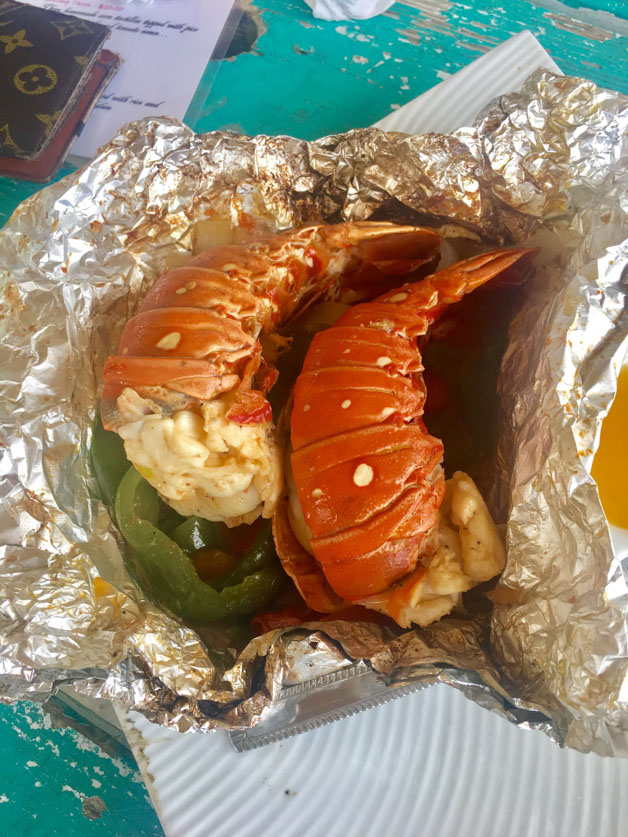
Conclusion
Traveling with food allergies, particularly for those with IBS and lactose intolerance, requires careful planning and communication.
By researching, learning local phrases, and being proactive in your approach, you can savor the flavors of Asia and Latin America without compromising your health.
Remember, with the right preparation and a positive mindset, your culinary adventure can be a delightful and safe experience.
Thanks for reading my guide on traveling with food allergies! I truly hope I have managed to help make your travels, easier and healthier too! For travel vlogs, don’t forget to subscribe to my YouTube channel!
For group trips and travel discounts, subscribe with your email at the bottom of this page!
And for giveaways, follow my Instagram account!
Love, Tia x
Save this post for later
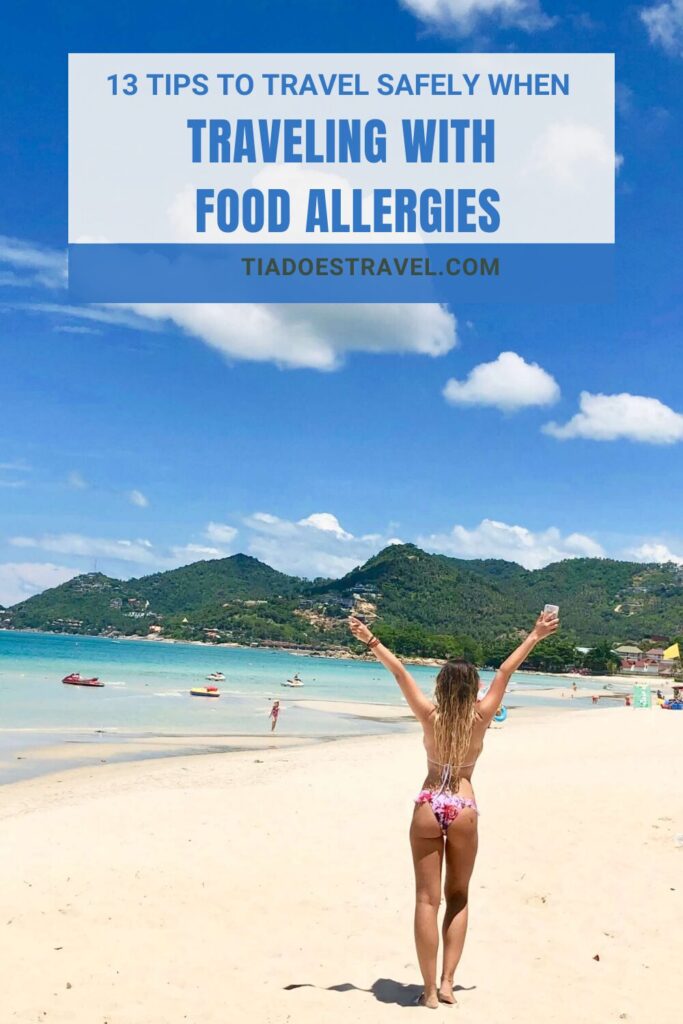

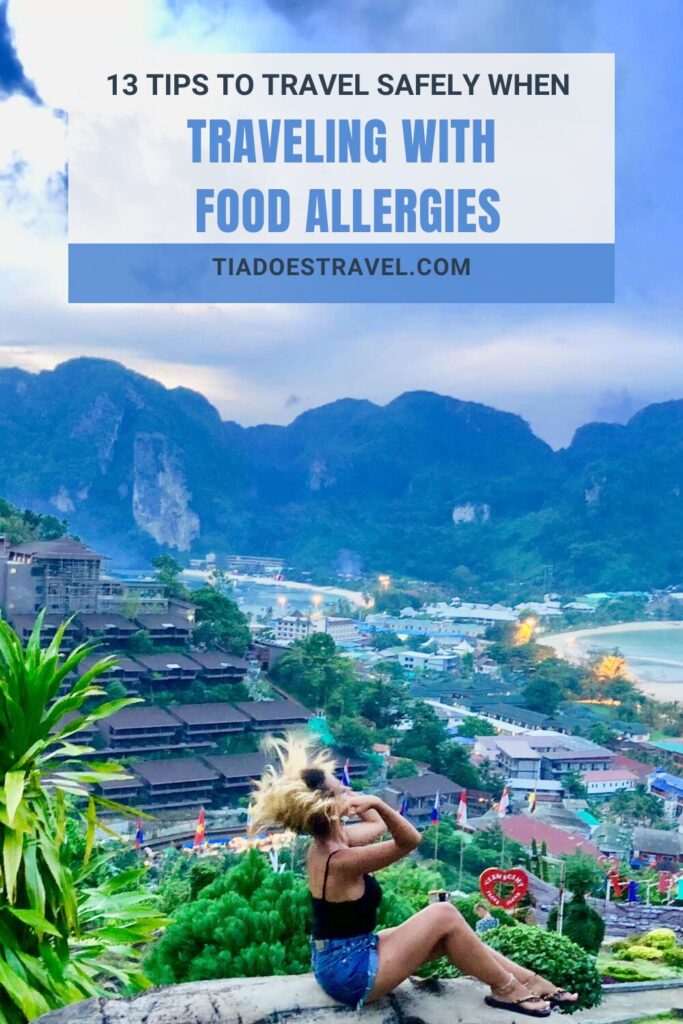
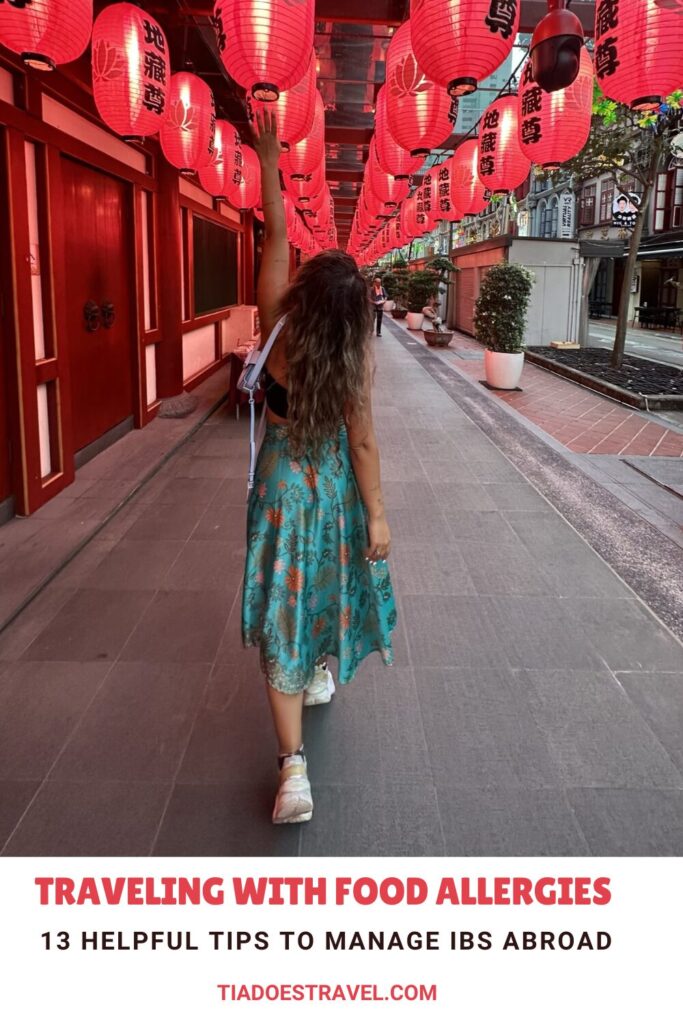
Related Articles you might like
- Traveling to China – Everything you need to know to explore China
- Exploring Thailand –Articles on Koh Samui, Phuket, and Phi Phi Islands
- Discovering Jordan – The very best on this jewel in the Middle East
- Indonesia Travel – Lots of articles on Bali and Komodo Islands
- Dubai and Abu Dhabi – Guides, and unmissable activities
- Belize Travels – Tropical Caribbean Holidays
- Costa Rica Adventures – One of the Greenest countries on the planet

1 comment
[…] can be a challenge, but with the right preparation, you can ensure a comfortable journey. Always inform the airline of your dietary needs well in advance; most offer special meals that cater to various restrictions, […]